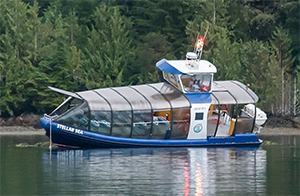Peering through binoculars, the captain of the 40-foot excursion boat Stellar Sea spotted a bear along the shore a mile away. While maneuvering closer to give passengers a better look, the vessel grounded on a charted rock barely visible in the surf.
Two people suffered minor injuries in the incident, which occurred on Oct. 1, 2016, at 1744 in Warn Bay, near Tofino, British Columbia. The aluminum craft sustained hull punctures and other damage, but no pollution was reported.
Transportation Safety Board of Canada (TSB) investigators cited insufficient voyage planning before the incident. They also found there was no dedicated lookout posted, and said the captain’s use of binoculars reduced peripheral vision and situational awareness.
“The master, alone in the wheelhouse, was performing multiple tasks that interfered with his ability to focus on the course ahead,” the TSB reported. “As a result, no one saw the protruding rock in time to prevent the accident.”
Jamie’s Whaling Station, the Tofino, B.C., tour company that operated Stellar Sea, did not respond to email seeking comment on the TSB findings.
The company also operated Leviathan II, which capsized in Clayoquot Sound in October 2015. Authorities said a breaking wave caused the 65-foot vessel to roll over, throwing passengers into the frigid water without life jackets. Six people died.
Stellar Sea departed Tofino at about 1615 with 26 passengers and two crew for a bear-watching excursion. The deck hand was on an open forward deck and the captain was in the wheelhouse.
Crew spotted a bear in the distance not long after departing, but it scampered back into the woods before Stellar Sea could get close. Using binoculars, the captain spotted a second bear along the shore an hour or so later at 1744.
At the time, Stellar Sea was traveling close to the unnamed charted rock the captain had safely passed during other bear-watching voyages. Based on tidal conditions, the rock would have been just above the surface.
“As the vessel continued to approach the rock at minimum speed, the master put down the binoculars, maintained visual attention on the bear, and instructed the passengers to sit and prepare for the vessel to increase speed,” the report said.
“The master began to turn the vessel toward the bear and increased the speed of the vessel to 7 to 8 knots. At this time, Stellar Sea was approximately 5 to 6 meters from the rock,” the report continued, noting that the captain saw it off the starboard side just before impact.
Not all of the passengers heeded the captain’s request to sit, and two fell when the vessel abruptly stopped, sustaining minor injuries.
Another Jamie’s Whaling Station boat, Pacific Springs, arrived soon after the grounding and nine passengers climbed on board. Loading was suspended because Stellar Sea’s portside heel was getting worse in the ebbing tide.
According to the report, Stellar Sea’s captain instructed the remaining passengers to abandon ship onto the rock. The Zodiac Rip Tide arrived about 50 minutes after the incident, rescuing the 17 passengers from the rock. Five were later transferred to Pacific Springs.
Stellar Sea’s captain did not report the incident to the Canadian Coast Guard or manually activate the vessel’s emergency beacon. Pacific Springs’ captain contacted the agency at 2222, after salvage crews were unable to refloat the stranded vessel, the TSB said.
The captain aboard Stellar Sea manually adjusted the route throughout the voyage to avoid obstructions and give passengers the best chance to see animals on shore. That said, investigators found the route was not planned on the chartplotter and the vessel’s shallow water alarms were disabled.
Crew aboard the excursion boat did not calculate safe passing distance from known obstructions and charted hazards, or note the vessel’s draft, tide conditions or navigation information on the chart, the TSB said.
“The practice of navigating close to shore and to navigational hazards put the vessel at an increased risk of an accident, such as running aground,” according to the report. “However, because there was insufficient passage planning prior to the occurrence, strategies to identify and mitigate the risks posed by potential navigational hazards were not identified.”
The deck hand was scanning the horizon for wildlife and was not serving as a lookout. Meanwhile, the captain was performing multiple duties, not giving “full attention to the keeping of a proper lookout,” as required by Canadian regulations.
Since the accident, Jamie’s Whaling Station has begun holding certain drills more frequently and has highlighted the need to contact the Coast Guard following an accident or during an emergency.
Stellar Sea came off the rock on Oct. 3 and was towed to nearby Ucluelet, B.C. It was repaired and returned to service.

